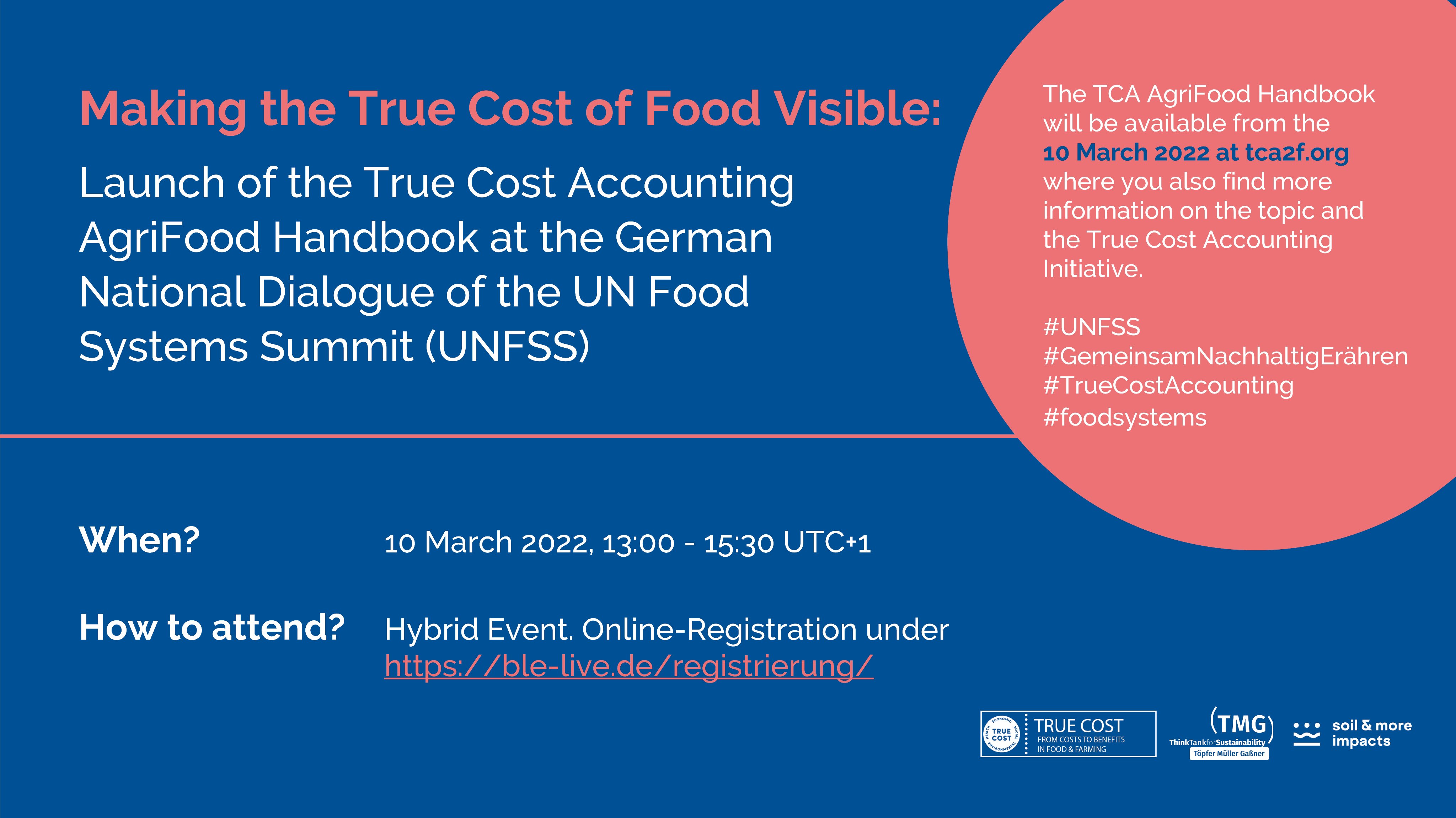Discussion
Making True Costs Visible: Launch of True Cost Accounting AgriFood Handbook
Launch of the True Cost Accounting AgriFood Handbook at the German National Dialogue of the UN Food Systems Summit (UNFSS)
The True Cost Accounting Initiative launched the True Cost Accounting Handbook on 10 March 2022 at the National Dialogue organised by the German Federal Agency for Agriculture and Food (BLE) following the UN Food Systems Summit (UNFSS).

True Cost Accounting practitioners during the launch of the Handbook on 10 March 2022
The BLE conducted the National Dialogue on behalf of the German Federal Ministry of Food and Agriculture (BMEL). The dialogue was launched in the context of the UNFSS, which took place in September 2021 in New York. The BLE continues the dialogue in 2022.
Consult the handbook here.
Read more about the launch event here.
The True Cost of Food
How food is produced and what we consume affect in many ways our natural environment, our livelihoods, and health. The current food system is responsible for 24% of GHG release and 70% of freshwater withdrawals. Agriculture is the primary driver of tropical deforestation and biodiversity loss and increases the risk of future pandemics.
The market value of global food is estimated to be around USD9 trillion, but external costs to the environment and society are estimated to be nearly double this figure, at USD19.8 trillion. This means that the food we purchase costs roughly a third of what it would if costs to society — such as environmental degradation or health costs — were taken into account.
Due to a lack of data and transparency, we often neither know the concrete effects nor the associated costs of our actions, leading to inaction at all levels.
However, environmental disasters and a global pandemic are raising the awareness of companies, investors, policy makers, and the public for the need to bring food systems on a sustainable path. Soon, stakeholders will expect companies to report on sustainability impacts and risks with the same discipline and rigour as on traditional financial information.
What is True Cost Accounting?
The prerequisite for targeted action and binding rules for a transformation of our economic system is therefore that we understand what effects our actions have on the environment and society.
True Cost Accounting (TCA) provides businesses and other stakeholders with a method to assess, value, and report the environmental, social, and human impacts in the food and agricultural sector.
The biggest obstacle to the implementation of TCA is currently the lack of consensus on a standardised application. So far, proposals have often been very theoretical and not practical. The True Cost Accounting Initiative has developed the TCA Handbook to address exactly this problem.
What is the added value of the True Cost Accounting AgriFood Handbook?
The handbook provides a TCA methodology for plant-based products that has been practically tested in 14 countries, on 5 continents, for 20 different supply chains.
The handbook is the first of its kind to provide users with concrete indicators and data collection methods to measure environmental, social, and human impacts along the value chain of food and agricultural products.
The handbook provides companies in the food sector with detailed guidance on how to calculate, monetise, and report all the costs of the food and agricultural products they produce.
Further information on the topic and the True Cost Initiative can be found at Tca2f.org and here on our TMG website.
In Harmony with Humanity and Nature: How a Project in Southern India Creates New Perspectives
An application of the True Cost Accounting methodology in India
Mar 11, 2022
Date
Organisers
German Federal Office for Agriculture and Food (BLE)
Location
Domäne Dahlem, Berlin, Germany
Languages
German


